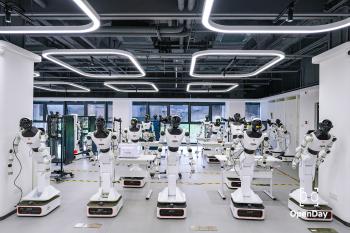Official start of the ‘Prometheus’ Horizon-funded action
On September 1st, the kick-off meeting was held in Valencia, Spain
The Prometheus’ consortium consists of twelve academic and industrial partners, and it is coordinated by the iPronics team in Valencia, Spain. Prometheus’ vision is to shatter the boundaries between quantum and neuromorphic photonic processing by building an integrated silicon photonic platform, able to accommodate the merits of both worlds; thus, paving new routes towards high performance computing and physical layer security.
In particular, Prometheus’ chips will provide the basis for a new generation of holistic neuromorphic processors and a new toolbox for quantum-enhanced security features such as quantum random number generation, directly from the same silicon chip.
In order to achieve such an ambitious objective, multiple cutting edge fabrication technologies will be combined for the first time. The photonic integrated chip (PIC) will rely on a highly dense silicon on insulator (SOI) field programmable photonic gate array (FPPGA) mesh at its core, strengthened by nearly-zero power-consuming non-volatile barium titanate (BTO) phase shifters. From an operational point of view, this layer will act as an adaptive synaptic layer, offering adjustable neural weighting and reconfigurability to the neuromorphic processor. At the same time, it will operate as a low loss configurable platform for quantum superposition.
The neuromorphic features of Prometheus’ proposition will be further enhanced by including multiple ultra-fast photonic spiking neurons, realized by co-integrating III-V multisection edge emitting lasers with SOI and BTO. For the first time, this pivotal step will allow the realization of a ‘true’ photonic neuromorphic processor, equipped with all the functionalities (both active spiking neurons and ‘plastic’ synapses). The overall scheme will be controlled through state-of-the-art sophisticated electro-optic packaging, able to control both the synaptic and the neural layer and to offer multiple GHz electro-optic interfaces that can unlock in turn ‘real-world’ and ‘near-future’ applications.
Prometheus’ chips will pave the way for the exploration of disruptive concepts such as large-scale multi-Gspike/sec photonic spiking networks, convolutional optical networks and futuristic quantum reservoir computing that combine neuromorphic and quantum computing. These architectures will tackle industry-driven applications: high-speed image processing and ultrafast signal processing for optical communications.
Moving a step further, Prometheus’ PIC will be used as a physical root of trust, unlocking its use as a quantum random number generator (QRNG) module and as a cyber-secure photonic physical unclonable function (PUF). These two operations will provide a pivotal advantage to Prometheus’ modules: to act as neuromorphic processors and at the same time, to provide hardware-based authentication and security features.
Prometheus consists of twelve partners from eight European countries with complementary expertise and roles, coming from top-notch academic and research institutes as well as SMEs with a strong R&D portfolio: iPronics (Spain), University of the Aegean (Greece), Technical University of Denmark (Denmark), University of West Attica (Greece), Ghent University (Belgium), QTI (Italy), CEA (France), Fraunhofer IZM (Germany), Scintil Photonics (France), IBM Research (Switzerland), Lumiphase (Switzerland) and Inivation (Switzerland). The project is funded by the European Commission with a contribution of almost four million euros under the CL4-2021-Digital Emerging-01-07 topic: https://prometheus-he.eu/
Contact
PROMETHEUS
Avenida Blasco Ibanez, 25, entresuelo
46010 Valencia
Spain
+34 960 195 435







